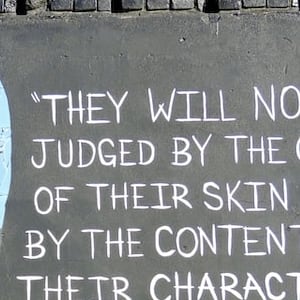not as black as one is painted: Idiom Meaning and Origin
What does ‘not as black as one is painted’ mean?
The idiom "not as black as one is painted" means that someone's reputation or character is not as bad as others may believe or portray them to be.

Idiom Explorer
The idiom "you can't judge a book by its cover" means that you cannot predict the true nature or value of something just by its outward appearance.
The idiom "paint a rosy picture" means to present a situation or idea in a way that makes it appear more positive or optimistic than it actually is.
The idiom "Oreo cookie" is used to describe someone who is black on the outside and white on the inside, indicating a person who appears to be one thing but holds opposite characteristics or beliefs.
An idiom meaning to present an alternative viewpoint or contrasting information.
The idiom "one's bark is worse than one's bite" means that someone may sound or appear threatening, but they are not actually as dangerous or harmful as they seem.
The idiom *one and the same* means that two or more things or people are identical or indistinguishable from each other.
The idiom "not in the least" means not at all or not in any way. It is used to emphasize that something is not even slightly true or important.
The idiom "nothing special" means that something is not particularly extraordinary or impressive. It implies that the person or object in question is rather ordinary or average.
The idiom "not half bad" means that something is better than expected or better than average. It is often used to express mild surprise or satisfaction with a situation or outcome.
Hidden Depths
When someone or something is described as "not a pretty sight," it means that they are unpleasant or unattractive to look at. This phrase is often used to describe something or someone who is in a disheveled, dirty, or otherwise unappealing state. It implies that the appearance of the person or thing in question is negatively affecting its overall impression or impact.
The idiom "not a pretty sight" is related to the expression "not as black as one is painted" in that they both convey the idea that appearances can be misleading. While "not as black as one is painted" suggests that there is more to a person or situation than meets the eye, "not a pretty sight" focuses specifically on the negative visual impact.
One example of the use of the idiom "not a pretty sight" can be found in the following passage from Jane Austen's novel "Pride and Prejudice": "On reaching the house, they were shown through the hall into the saloon, whose northern aspect rendered it delightful for summer. Its windows opening to the ground, admitted a most refreshing view of the high woody hills behind the house, and of the beautiful oaks and Spanish chestnuts which were scattered over the intermediate lawn. In this house they were received by Miss Darcy, who was sitting there with Mrs. Hurst and Miss Bingley, ...and as his composure convinced her that all was safe, her wit flowed long."
Another related idiom is "one's bark is worse than one's bite." This expression suggests that a person's words or threats may sound more severe or threatening than their actual actions. It implies that someone may talk tough or make intimidating statements, but they are not as dangerous or aggressive as they may initially seem. This idiom shares the same concept of appearances being misleading as "not as black as one is painted."
In the context of the idiom "one's bark is worse than one's bite," the idea of not judging a book by its cover becomes relevant. This popular saying reminds us that we should not make assumptions or form opinions based solely on outward appearances or first impressions. It advises against hastily judging someone or something without having all the relevant information or fully understanding the situation.
When we consider these related idioms in the context of the idiom "not as black as one is painted," we see a common theme of not relying solely on appearances to form judgments or opinions. In each case, the idioms caution against making assumptions based on initial impressions and encourage us to look deeper to uncover the truth.
Furthermore, the idiom "cast aspersions" also relates to the idea behind "not as black as one is painted." To cast aspersions means to make negative or damaging statements about someone or something, often without sufficient evidence or justification. This idiom shares the notion that appearances or reputations can be deceiving. While "not as black as one is painted" suggests that there is more to a person or situation than meets the eye, "cast aspersions" explores the potential harm that can be caused by making unfounded or unfair judgments.
Lastly, we can see how the idiom "you can't judge a book by its cover" connects to the concept expressed in "not as black as one is painted." This saying emphasizes the importance of not forming opinions or making judgments based solely on external appearances or superficial characteristics. It encourages us to look beyond the surface and consider the true nature or value of something or someone before reaching a conclusion.
The idiom "not as black as one is painted" encompasses the idea that appearances can be deceiving and that there is more to a person or situation than initially meets the eye. This idiom is related to other expressions such as "not a pretty sight," "one's bark is worse than one's bite," "cast aspersions," and "you can't judge a book by its cover," which all explore similar themes of not relying on superficial appearances or initial impressions to form judgments or opinions.
Example usage
Examples of how the idiom "not as black as one is painted" can be used in a sentence:
- Despite his reputation for being rude, John is not as black as he is painted. He is actually very kind and helpful.
- People often judge her based on her appearance, but she is not as black as she is painted. She is a talented and intelligent individual.
- The media portrayed the politician as corrupt, but he is not as black as he is painted. He has implemented several beneficial policies during his tenure.
More "Appearance" idioms



